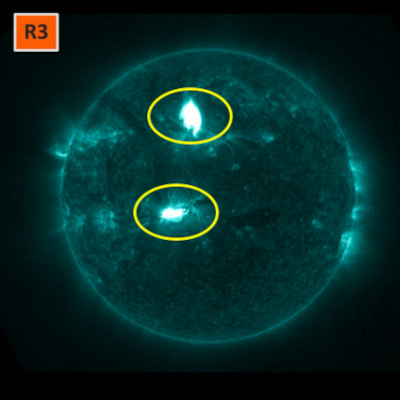Space Weather On The Way
 Figure 1: "NOAA Image March 22 2024. See link below"
Figure 1: "NOAA Image March 22 2024. See link below"
I've received two accounts of this in the past 24 hours from different sources so it's "doing the rounds".
First: this is probably nothing to worry about
The NOAA Space Weather Prediction Center said;
"Users of high frequency communications may experience degradation or loss of service. The general public need not be concerned."
Although the storm is described as "strong" the effects will be "moderate".
It raises the question of how we deal with this sort of news from a cybersecurity standpoint. Integrity of data seems the most salient matter for continuity of operations.
Because we get rather short warnings of this sort of space weather (about 3 days) and the mainstream media are unlikely to relay this kind of thing because it's not very interesting. I thought it may be worth a heads-up in case it saves someone's data. Anyway, I personally decided to observe some simple easy to do precautions which might might be prudent and make an unscheduled backup.
What is a solar storm?
Report 1 NOAA
Report 2 SolarHam What is "space weather"?
Out in space are all kinds of powerful forces, X-rays, Gamma-rays, particle storms and much more that would be lethal to human life and our technology.
Fortunately our atmosphere and the Earth's magnetic field protect us from them.
One source is our own Sun, which occasionally ejects "flares" of charged particles. Most of the time they head away from Earth. Sometimes, like yesterday, they head our way. The expected arrival for this storm (AR361501) is between tomorrow (Sunday 24 Mar 2024) afternoon and the next day (Monday 35 Mar 2024). What can happen?
Things at risk in severe storms are electronics with sensitive parts. Things like coils and electromagnets, transformers and long copper cables. In very severe solar storms these can get a jolt of electricity that might damage other things that are connected. The storm en route is categorised as moderate to strong. Not severe. The chances of experiencing problems seem very low.
That said, we cannot predict the severity of effects accurately. Unlike everyday Earthly weather, solar storms don't happen often so scientists don't see much data or get as much experience with them. Therefore it might be sensible to take some simple steps. Precautions to take
The thing to be a bit concerned about is data. If an old hard drive or device with important data on it fails, you might lose it.
You should already do a regular backup. This weekend, do an extra one as soon as you read this. Copy important files to a USB drive. If you do a regular scheduled cloud backup, initiate one now.
If you're transferring important files over 5GHz wifi, make doubly sure they've correctly copied.
USB drives and phones can be put in a Faraday wallet until Tuesday… like those used to protect contactless cards. Better still, a metal (steel) tin like a biscuit tin or a steel filing cabinet is perfect protection.
That's it.
Just one extra backup for peace of mind.
We probably won't see another "strong" Earthbound flare for many years.

.jpg)